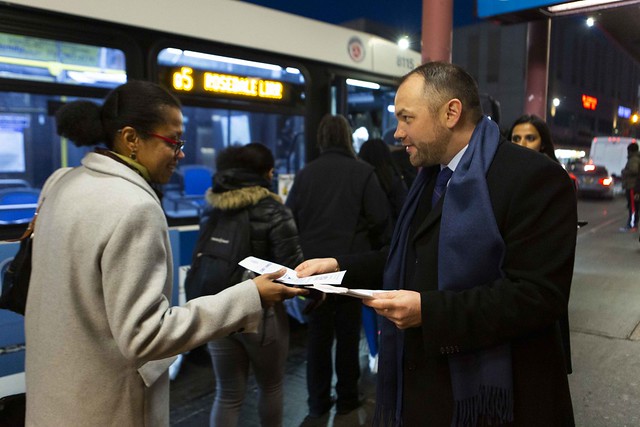City Council Speaker Corey Johnson is putting his legislative muscle where his mouth is.
Three months after he proposed a five-year plan to prioritize people who walk, bike, and take mass transit over people in motor vehicles, Johnson is set to introduce legislation next week requiring city officials to build 150 miles of dedicated bus lanes and 250 miles of protected bike lanes within five years [PDF].
"The way we plan our streets now makes no sense and New Yorkers pay the price every day, stuck on slow buses or risking their own safety cycling without protected bike lanes," Johnson said. "I want to completely revolutionize how we share our street space, and that’s what this bill does. This is a roadmap to breaking the car culture in a thoughtful, comprehensive way."
New York City has significantly expanded its protected bike-lane network under mayors Bloomberg and de Blasio, but not nearly to the extent necessary, given the increasing carnage of people biking on city streets. In his best year, 2017, de Blasio's Department of Transportation built almost 25 miles of protected bike lanes, which dropped to less than 20 miles last year. Currently, the department has committed to at least 10 miles of new protected bike lanes a year.
Even when it seeks to proactively redesign streets, the city considers its impact on private vehicle speeds and parking concerns. As a results, the improvements have been piecemeal — neighborhood-by-neighborhood, block-by-block — with DOT going to great lengths to appease recalcitrant community boards.
Johnson, a likely mayoral candidate in 2021, wants to change that — or, in his words "break the car culture." Aside from a nod to "traffic congestion," Johnson's bill makes no mention of people in private cars and, in fact, sets priorities to counterbalance their omnipresence.
The bill sets priorities at every level. Even parking policies for delivery trucks, according to the bill, should be based not on the immediate needs of drivers, but on the "safety of pedestrians and individuals using bicycles; access to and use of public transit; reduction of traffic congestion and emissions; and improving access to streets, sidewalks, public spaces, and mass transit for individuals with reduced mobility, hearing, or visual impairments."
The bill offers benchmarks, and the city would be required to account for each one. DOT would have to release its first plan this October, with specific plans on how it will achieve the following items within five years:
- at least 150 miles of protected bus lanes;
- at least 1,000 intersections with signal priority for buses;
- at least 250 miles of protected bicycle lanes, or 50 per year;
- citywide bus stop upgrades;
- and commercial-loading-zone reforms that prioritize people who don't drive.
By 2021, the agency also would have to double the city's total pedestrian-plaza acreage and add 12 new "shared streets," where speed limits are capped at five miles per hour.
The 10-year goals are even more ambitious:
- a completely connected bike network;
- protected bus lanes everywhere feasible;
- "accessible pedestrians signals" at all relevant interactions;
- and compliance with ADA accessibility at all intersections.
It also creates a metric for the safety of the bike network, called the "bicycle-network connectivity index," based on "the number of choices a cyclist has for turning from one bicycle route onto another," the bill states. The 2024 master plan would charge the city with completing an entirely connected protected bike lane network by 2029.
Advocates hope a citywide approach will alleviate the effect of community-board opposition to bike lanes and other non-auto street project, because city officials will be able to point to the citywide effort and roadmap as justification for more local actions.
Whether the DOT under Mayor de Blasio and Commissioner Polly Trottenberg is willing to push for such radical changes is another question.
"This is a potentially very powerful tool in the hands of a mayor who wants a more powerful bike network," said Bike New York Communications Director Jon Orcutt, a former city transportation official under Mayor Bloomberg. "You set a bunch of project ideas and then you don’t really have to go back and revisit those decisions. You potentially get past having a year-long debate over every single bike lane or every piece of every bike lane."
DOT spokesman Scott Gastel said the agency is reviewing the bill, and disputed the current narrative that the mayor has lost the focus of his signature Vision Zero campaign as he runs for president. The administration has committed to reducing traffic crashes and improving bus service, most recently with the mayor's pledge to improving bus speeds by 25 percent within a year, Gastel said.
None of the administration's effort go nearly as far as Johnson's agenda.






